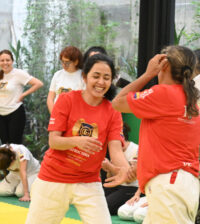- Belgium comes to Yamashita Park
- Residential Villa in Phuket Entices Remote Workers With Long-Stay Rates
- Rare pieces of French glass art at the Mirai Museum of Art
- Feast on fresh fish and seafood at the 2024 ‘Sakana’ Festival
- Would you like to ride in a Louis Vuitton gondola lift?
- Naked Snow Aquarium
- Festive lights at Yomiuriland will get you feeling the holiday vibes
Q. Can my toddler learn a second language at home before starting school?

Answered by Deborah D.K. Ruuskanen, Professor of English Linguistics at the University of Vaasa,
Yes. It is entirely possible to teach an infant two or even three languages, and four is not unheard of. In Europe, a great many toddlers learn four languages with little or no difficulty. The main requirements for this learning are: the parents speak only their mother-tongue to the child; the child has some reason to learn the languages (motivation); and there is reinforcement of some kind for these languages, preferably outside the home. If the language of the environment is a third language, then the child will easily learn the third language once they start playing with neighbourhood children.
There appears to be a ‘window’ of learning language that ‘opens’ at about the age of ten months. Infants can hear much earlier, of course, and there is some evidence that they can even hear in the womb. It is clear that they will begin to imitate the ‘noises’ they hear, and when there is a reaction from their caregivers, they begin to associate meanings with the sounds. Over the next two years, infants acquire language at an astonishing rate. By the age of three, they have acquired basic syntax (sentence structure), basic grammar (the ‘rules’ of the language), and a large vocabulary of basic words necessary to their physical and emotional survival. Their motivation to talk with their caregivers is high: asking for something usually results in being given the thing they need. Similarly, when the infant begins to play outside, with other children, then the motivation to talk to these children is high, and the infant will try to learn the language of play. Later on, at school, the language of the school will be important, too.
THE IMPORTANT THING TO REMEMBER IS THAT EACH CHILD IS AN INDIVIDUAL, and that each child will learn when they are ready to learn. If you think your child is ‘late’ learning to talk, be sure you have ruled out all possible physical causes, including possible deafness, and then just wait. Especially if there is more than one language in the baby’s home environment, then the baby will be learning first to process and separate the different languages, before talking begins. This ‘separating the languages process’ is why it is important that each parent speaks only their mother-tongue to the baby. They can speak a third language among themselves if they want the baby to hear and become familiar with that language as well, but it is important that the baby hears native-speaker sounds if you want the baby to make native-speaker sounds.
There is considerable debate among linguists as to when the ‘language learning window’ closes, if it closes at all. However, there does seem to be an ‘optimal’ age for language learning, when the child’s mind is still open and flexible, and not cluttered with all sorts of other learning, not to mention the society’s views on which languages are ‘prestige’ languages, and which ones are regarded by the society as of little or no importance. The latter affects motivation: children will be admired for speaking a ‘prestige’ language, and teased and bullied for speaking a ‘non-prestige’ language. When the mind is being taught many many other things than language, there is less ‘processing space’ left for language learning. At the moment, the ‘optimal’ time for learning a second language appears to be ‘at the same time as the first language’, i.e. in the home beginning at birth to three years (providing the parents speak these two languages as their mother tongue). The next best time for learning a second, third, and even a fourth language, appears to be between the ages of two to seven years. A third period for learning a second language is from about ten to thirteen years of age, this is in cases when the second language is not the language of either the parents or the environment. This is the reason behind the push to introduce ‘foreign’ language learning into the curriculum of elementary schools, in the grade when the child is about ten-eleven years old.
Parents who want their children to learn their mother-tongue must realise that it will take work, beyond simply speaking their mother-tongue all the time to the child. Especially if the spouse speaks another language, which is the language of the environment, the parent speaking the ‘minority’ language will have to be sure that there is sufficient input for the child to learn and reinforce what has been learned. This means things like reading out loud (this should go on until the child learns to read on their own, and for a few years afterwards until the child says stop), singing to them and teaching them songs and nursery rhymes, showing video films in the parent’s language (radio is not as good as there are no visual clues), and having other adults or children talk to the child in this language (grandparents are invaluable here). Taking the child to visit in a country where the parent’s language is the language of the environment is also a good idea, if it is practical: sending the child to spend time with grandparents at about the age of eleven or twelve is also a good idea, for many reasons. This is probably a good place to remind parents that a multilingual environment is also a multicultural environment, and that it is very difficult if not impossible to separate language from culture. Without a context (culture) for the language, the child will have difficulty making sense of the meanings underlying the words.
Parents should make sure the child has a firm grounding in the parents’ own languages before trying to teach a third language. This should if possible include learning to read and write in at least one of those two languages. Some countries in Europe offer children in the early grades of elementary school the possibility to learn to read and write in their ‘home’ language: parents should check if this is possible in their local schools. Parents who want to teach their child to read at home should remember that linguists think it is impossible to teach a child to read before they have learned to talk: first the child learns a system of sounds that have meaning, and how to put these ‘meaning’ sounds together in a larger system; then the child learns a system of symbols (letters or ideograms) that have the same meanings as the sounds and/or combinations of sounds. A phonetic system of learning to read is preferred by many linguists, for languages that have alphabets. Teach the child the sounds of the letters first, then teach ‘sounding out’ the words from the letters. Simply reading aloud to a child while holding the child in your lap and putting your fingers under the big letters in a picture book, or under the words in a storybook, is one method of teaching a young child to read. It is rare that a child learns to read under the age of four. Writing can be taught at the same time as reading, or after the child has learned to read: begin with making separate letters, and the first written word taught is usually the child’s own name.
Problems will arise when the child starts playing with neighbourhood children who do not speak the language the parent is trying to teach them. This is the stage when a lot of parents give up. The child does not want to be ‘different’ from their playmates, and speaking a ‘foreign’ language certainly makes you different. If the parent refuses to answer the child, or to give them what they want until they ask for it in the parent’s ‘own’ language, the process of learning the language will continue. Some parents make an agreement to talk to the child in the language of the playmates when the playmates are around, and the ‘home’ language when only family is ‘home’: personally I think this does not work well. The problems will increase when the child starts kindergarten. The parent must keep speaking only their ‘own’ language with the child, or the child will lose the language.
At this point, the question of putting the child in a ‘foreign’ language school comes up. This is a hard decision to make, especially if the child is already ‘different’ because their mother or father is a ‘foreigner’, because taking a child away from neighbourhood playmates and putting then in a different school will make them even more different, and more likely to be teased and bullied by the neighbourhood children. Having said that, putting a child in a ‘foreign’ language school will certainly ensure that they learn that language. For example, a child living in Sweden, whose father speaks only Portuguese to them, and whose mother speaks only Finnish to them, and who is put in an English school, will learn Swedish, Portuguese, Finnish, and English. However, if this child grows up and goes to university in England, and has little or no contact with Finnish relatives, then the Finnish will almost certainly be lost. Languages need to be spoken, or they will be lost.
Teaching a child a language that is not the mother-tongue of either parent is usually not a good idea. Unless the parents are completely bilingual themselves, that is, they speak two languages as native languages, then the sounds that are produced for the child to imitate will be tinged with a strong ‘foreign accent’. Similarly, unless the parent speaks the non-native language exceptionally well, then the child will learn the mistakes that parent makes in that language. Finally, and perhaps more important, teaching a third language that the parent does not know well will confuse the child unnecessarily. Wait until the baby has mastered the native languages of both parents well enough to be able to have long, meaningful conversations (about five years old) and has begun to play with other children, before deciding about introducing a language that the parents do not speak well. Remember that the child will learn the language of the environment and the school even without input from the parents. Trying to teach the child an artificial language, such as Klingon or Elvish, for example, can be done only if both parents speak it well enough to converse in it daily where the child can hear them. Again, this must be considered a ‘third’ language, and teaching it is best done only after the child has learned the parents’ languages well. Children who do not use this ‘artificial’ language in their teen years will almost certainly lose it, since as said above, languages need to be spoken or they will be lost.














